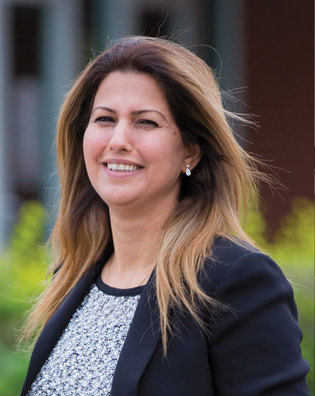 loading
loading
New HavenPutting out the welcome mat for refugeesA New Haven nonprofit helps refugees feel at home, and get on their feet.  Maher MahmoodBushra Mahdi and her family escaped death threats in Baghdad and have been resettled by IRIS, a New Haven nonprofit that helps refugees adjust to life in the United States. View full image“I was working in the US Embassy,” says Maher Mahmood, 22. “Then they shot my father and told my family that I was next.” This was how he and his mother came to be in the waiting room of Integrated Refugee and Immigrant Services (IRIS) in New Haven, where I met them on my way to speak with IRIS’s director. Their family—with Mahmood’s three siblings (aged 12 to 20) and his father, wounded but alive—escaped the militias by fleeing their home in Baghdad. Since their arrival in April 2014, IRIS staff and volunteers have shepherded them through the bureaucracies and intricacies of daily life in the United States. “Chris is my father,” says Bushra Mahdi, Mahmood’s mother, laughing. She’s referring to IRIS executive director Chris George. “First they gave us a phone to call our family in Iraq. They brought us to our apartment and there was furniture, and everything, everything was ready. In the first weeks they took us to the Social Security office, showed us how to take the bus, how we go to Yale–New Haven Hospital, and how to deal with the schools.” Both speak English; Mahmood studied it in Baghdad, but Mahdi learned it here. IRIS made headlines this past fall, when George invited the Syrian family that had been turned away by Indiana’s governor to settle in New Haven. The nonprofit’s mission is to help refugees adjust to their new country. “We support all refugees by providing a New Haven,” reads the first line on the IRIS website. Founded 33 years ago by the Episcopal Church in Connecticut, IRIS currently receives $800,000 of its $1.4 million annual budget from the federal government, and the rest, about $400,000, from private sources, including individual donors. Each year, IRIS resettles about 240 refugees, greeting them at the airport, bringing them to prearranged furnished rental apartments with stocked refrigerators, and, on their first night, insuring they have a hot meal—prepared by someone from their home country. (The warm, culturally appropriate meal is federally mandated.) Almost everything, including food, furniture, and some winter clothing, is donated. Each refugee family gets a $1,000 one-time grant, funded by the federal government, toward rent and other necessities. Then the IRIS support network really kicks in. IRIS provides free English classes for adults every weekday morning and a playgroup for toddlers. Staffers make sure older kids are enrolled in school, help them stay on top of their academics, and run an after-school program. When they reach college age, “we all wind up helping,” says Tanya Kimball Genn, education coordinator; “I took a kid to visit Southern [Connecticut State University] a month ago.” “The mantra of the program is self-sufficiency,” says employment and education services director Will Kneerim. Helping refugees find jobs is all-important. That can be a challenge for non-English speakers; 70 percent of the refugees find jobs within four months, 90 percent in six months—but it’s hard. “You’ve got to learn English and be willing to accept any job,” says George. Highly educated people may find themselves working in factories, or as housekeepers in hotels. (A few have found temporary employment as translators at Yale: Levantine Arabic and Tigrinya, spoken in Ethiopia, are in demand.) Since early last September, more than 50 groups around Connecticut—churches, mosques, synagogues, and even a book group—have asked to partner with IRIS in resettling refugees in their own communities. That’s up from two or three per year in the past, so IRIS has asked the State Department to double its annual quota of refugees to some 500. Currently, the Syrian family that arrived in late November is starting to settle in. The parents take IRIS’s English classes, their four-year-old is in daycare, and the father, who owned a clothing store in Syria, works part-time at IRIS sorting donated clothing. As for Mahdi’s family, they are happily resettled—though they still drop by IRIS when they need help with some baffling new aspect of US life. At IRIS, says Mahdi, “each one knows what he is doing.”
|
|
1 comment
-

William D. Hall, 9:40am March 11 2016 |  Flag as inappropriate
Flag as inappropriate
The comment period has expired.IRIS is a wonderful organization. I am chairing a co-sponsoring group, and, as a Yalie (JE '69), this gives me yet another reason to be proud of New Haven! IRIS provides an opportunity, not only to be part of a humanitarian miracle, but also actively to counter some of the vitriol spewing from some our presidential candidates.